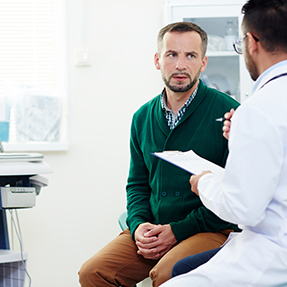
Telling family and friends, you have cancer
Hearing you have cancer is hard enough. Telling your family and friends the news is even harder. There is no easy or right way to let others know or how much you want them to know. That information is personal and depends on what suits your comfort zone.
But, at some point, you will need to tell your family, employer, close friends, and any other pertinent individuals who need to know of your diagnosis. Going through cancer is not a journey to go on alone. However, only you decide the amount of information to tell each person during your fight against cancer.
Why support from family and friends matters
Depending on your cancer and how it’s treated will determine how revealing you want to be about your diagnosis. When treatment begins, there can be physical changes (e.g., hair loss, nausea, or extreme fatigue) that will not go unnoticed. You may also need some day-to-day assistance. Having family and close friends willing to help out will be a gift not to pass up. This may include helping with transportation to doctor’s appointments, picking up prescription medicine, groceries, or other household tasks needing attention.
Emotionally, you will need someone who will listen without judgment, providing psychological support during stressful times. Or even during good times when you feel like celebrating good news or simply enjoying life. You shouldn’t have to shoulder the weight of having cancer alone. Whether it’s a beloved family member or close friend, or a work colleague, it’s good to share this unexpected journey called cancer with someone by your side.
Letting others know about your diagnosis
Once you know you have cancer, you need to consider the conversation of letting others know and how you want to tell them. However, if you need to, allow yourself some time to process the news before getting the word out. Then, once you’re ready, keep two things in mind: Be open and honest. This doesn’t mean it’s necessary to go into great detail unless you want to. But it does mean providing information about the type of cancer you have, how it will be treated, and asking for their understanding and support during this time.
In our technologically driven world, it’s advised not to tell others through a text message or email. Ideally, meet them in person, setting up a time to talk, making it more personal and easier to open up.
Plan ahead of what you will say. Practice out loud how you will begin the conversation and anticipate what questions will be asked and how you will answer them. The better prepared you are for people’s reactions to the news, the better the conversation exchange will be overall.
One of the more difficult conversations is telling young children or grandchildren about your cancer. It can be an emotional rollercoaster. You may want to protect them by not saying anything. But, depending on a child’s age, be direct and honest. Name it by using the word “cancer.” Kids are intuitive and can sense something is wrong, and if you avoid telling them the truth, it can exacerbate their fears. Keep the message and language simple and avoid overwhelming them with details. Children who ask a question you don’t have an answer for, be honest and say, “I don’t know.” Stay calm and use a reassuring voice, but it’s also okay to show sadness. Let children know that the family is in this together and will support one another during this time.
If someone asks a question, you don’t want to answer, simply say, “That’s information I’m not comfortable sharing.” Most people you know do not need to know your medical information.
What about using mainstream social media to let others know about your cancer diagnosis? Is this a good idea or not? While it’s a personal decision on your part, you need to think through possible ramifications before hitting “click” getting the message out there. Sharing too much information might trigger negative feedback or trigger pseudoscience marketing on your newsfeed. Determine for yourself what feels comfortable to you. However, consider using CaringBridge if you still want to share more detailed information with family and friends on the internet. CaringBridge is a free online tool that allows you to communicate and share health updates to family and friends without being exposed openly on other social media platforms.
Most importantly, keep life as normal as possible during cancer treatment. Keep doing the normal, regular things with your family and friends, such as enjoying hobbies, sports, exercising, vacationing, etc. You will benefit from living a normal day-to-day life, and so will your family.
Dr. David Samadi is the Director of Men’s Health and Urologic Oncology at St. Francis Hospital in Long Island. He’s a renowned and highly successful board certified Urologic Oncologist Expert and Robotic Surgeon in New York City, regarded as one of the leading prostate surgeons in the U.S., with a vast expertise in prostate cancer treatment and Robotic-Assisted Laparoscopic Prostatectomy. Dr. Samadi is a medical contributor to NewsMax TV and is also the author of The Ultimate MANual, Dr. Samadi’s Guide to Men’s Health and Wellness, available online both on Amazon and Barnes & Noble. Visit Dr. Samadi’s websites at robotic oncology and prostate cancer 911.
